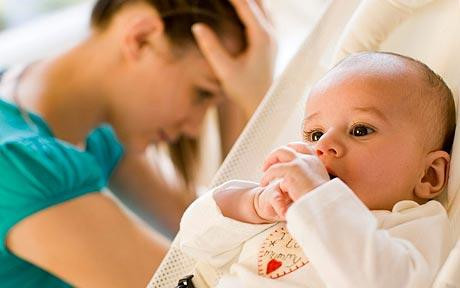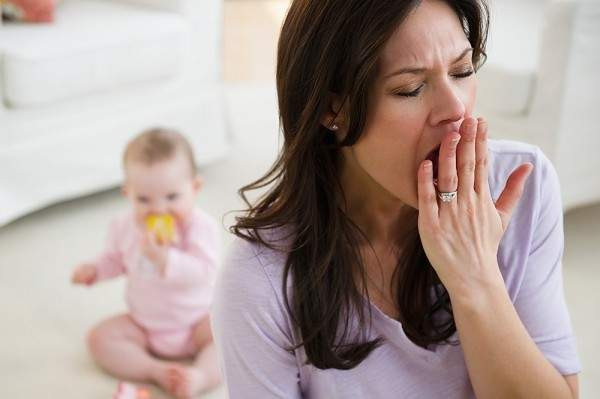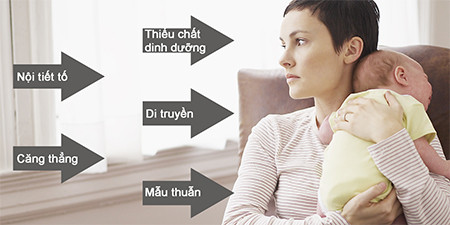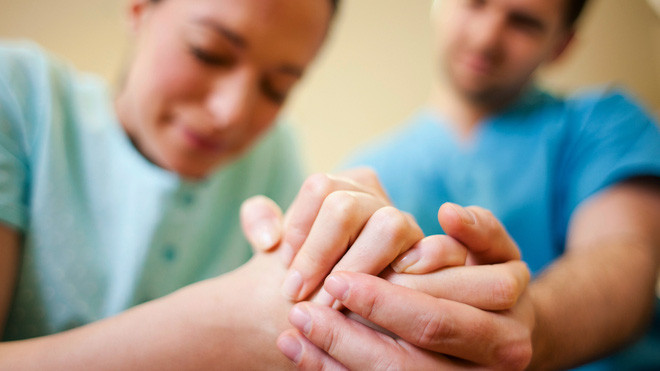Postpartum Depression - Signs, Causes and Prevention
(Baonghean.vn) - Women are endowed by nature with the duty of motherhood, which is sacred and something to be proud of for us women. But along with that duty are diseases related to the birthing period. One of those diseases is postpartum depression.
Depression causes many serious consequences. In addition to the effects on psychology and health, it is also the cause of bad behavior, even suicide.
 |
| Illustration photo. |
1. Symptoms of depression:
If you see signs of postpartum depression lasting more than two weeks along with the following symptoms:
- Likes to be alone, afraid of communication: Usually only likes to stay in a room alone, does not like to go to crowded places, and does not even want to talk to anyone.
- Addicted to social networks, don't like to talk face to face: These people talk a lot on social networks but completely withdraw in real life.
- Often feel sad and depressed: This feeling occurs continuously and lasts for several weeks or more.
- Always feel tired: Even when not doing heavy work, just sitting in one place, the patient still falls into a state of lethargy and lack of vitality.
- Loss of concentration, not wanting to work: Not only due to health, the patient also loses all interest in work, not wanting to do anything.
- Pessimism, feeling useless or guilty: Feeling of losing faith in everything in life.
- Easily irritated: People with depression often get angry for no reason with others or over very small things.
 |
| Illustration photo. |
- Often feel anxious and insecure: This anxiety often comes from very unreasonable things, even unreal, only imagined by the patient.
- Insomnia or sleeping too much: This sudden change in lifestyle and activities is also a sign of depression and it is also the cause of subsequent health and psychological consequences.
- No longer interested in hobbies: No longer have any interest in hobbies that you used to have.
- Anorexia or bulimia: Leads to sudden weight loss or uncontrolled weight gain.
- Thinking about death: This sign is not uncommon, occurring in almost half of people with depression.
Causes of postpartum depression
 |
| Causes of postpartum depression. Illustration photo. |
- Hormonal changes: Research by Australian scientists has shown that the increase in estrogen and progesterone hormones during pregnancy affects the development of the most important parts of a woman's central nervous system.
Estrogen levels during pregnancy can be several hundred times higher than normal, thereby changing the brain's neurogenesis or nerve cell regeneration, causing women to become forgetful and reluctant to communicate.
In addition, changes in blood volume, blood pressure, immune system, and rapidly decreasing thyroid hormones also make women susceptible to fatigue, abnormal psychological changes, and depression...
- After giving birth, women also have to face many physical and psychological problems: The pain of childbirth, even having to have a cesarean section, can last for several weeks after giving birth. Psychological problems such as when the baby is born, the body loses a significant amount of weight, mothers often feel that they become ugly and no longer attractive. They often have to change their lifestyle to take care of their children, especially for first-time mothers. They are often too worried about their responsibilities as mothers.
- Risk factors for postpartum depression are those with a history of depression are more likely to relapse after giving birth, stressful events during pregnancy or childbirth such as difficulty during labor, children having health problems at birth, premature birth, or illness during pregnancy. Women with unhappy marriages or without family or social support are at a very high risk of depression.
How will maternal depression affect the child?
Children whose mothers have postpartum depression may have the following effects:
- Behavioral problems: These children tend to have unusual behaviors, such as sleep problems, explosive behavior, agitation, and hyperactivity.
- Slow cognitive development: These children are often slow in cognitive development, slow to speak, slow to walk than other children. They may also have difficulties in learning and other problems when at school.
- Social problems: These children often have difficulty in relationships at school, with friends of the same age, children often withdraw from social relationships or have abnormal behaviors.
- Emotional problems: These children often have low self-confidence, are prone to anxiety and fear, are more passive than other children, are often dependent and are at high risk of depression and autism.
How to prevent postpartum depression
For the mother herself:
 |
| Remember that you are always the best mother for your child. Illustration photo. |
- Avoid working or studying too hard... After a tiring day, you should take time to rest and relax. On weekends, go out to meet friends and participate in group activities.
- Make time for your hobbies.
- Don't "lock yourself" in the "virtual world" but go out and talk and confide in people more.
- Regular exercise is also a way to prevent depression.
- Try to get some sleep. Try to go to bed earlier if you have to wake up in the middle of the night to feed your baby. Take a nap in the afternoon, even if it is only for 30 minutes.
- Talk and share with friends, family or psychologists to relieve the tired feelings inside.
- Ask friends and family about their experiences with baby care.
- Remember that you are always the best mother for your child, never compare yourself or your child with others, do not let the pressure weigh on your shoulders.
Role of relatives:
In addition to mothers paying attention to themselves, relatives should also pay more attention to postpartum women. Sometimes, the people involved cannot know that they are suffering from depression, so everyone's attention is extremely necessary.
It can be said that in this sensitive period, the role of the husband is very important. Many husbands think that just providing material things for their wives is enough without realizing that caring, sharing through actions and encouraging words can help their wives avoid the risk of depression.
 |
| Postpartum women need the care and sharing of their husbands. Illustration photo. |
More than anyone else, the husband, family, relatives... need to be close and share with the mother during the postpartum period, to avoid unfortunate consequences that may occur:
- Care, share, and talk to "breastfeeding mothers" gently.
- Always keep mothers in a stable mood, comfortable spirit, do not scold or yell when they do wrong.
- Pay attention to a reasonable diet, sleep and lifestyle for newborns.
In severe cases, do not hesitate to take the patient to see a psychologist before serious consequences occur.
Pear Flower
(Synthetic)
| RELATED NEWS |
|---|

